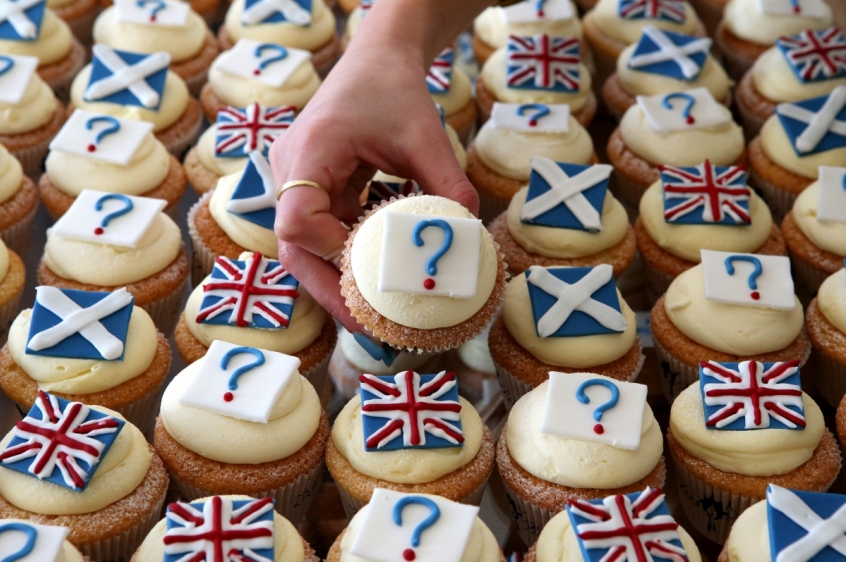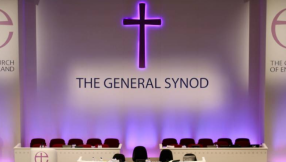
A debate on Scottish independence more than 350 miles south of the border may be lost on some people, but Scots living in the capital are taking a keen interest in the fate of their homeland.
As the Minister of the London-based St Columba's Church, Angus MacLeod, pointed out at a debate on independence last night: "London Scots cannot vote, but they know a lot of people who will."
The issue of Scots south of the border not being able to vote in the referendum was the biggest concern of the more than 450 people who turned up yesterday evening to hear from representatives of the Better Together and Yes Scotland.
The BBC's Iain Watson chaired the panel, with Better Together represented by two Scots, Alistair Carmichael, the Secretary of State for Scotland and Liberal Democrat MP for Orkney and Shetland Islands, and Margaret Curran, the Labour MP for Glasgow East, and Mr Carmichael's opposite number in the Shadow Cabinet.
Yes Scotland was represented by Angus Robertson, of the Scottish National Party MP for Moray and leader of the SNP in Westminster, and businessman Tony Banks, who owns Balhousie care group.
Answering the question that was on almost everyone's submission cards, of why Scots in other parts of the UK would not be able to vote, Mr Carmichael first said: "I completely understand the frustration, on an emotional level, that many people feel about this."
Mr Robertson also shared Mr Carmichael's feelings, but by way of explanation, he said: "The truth of the matter is that we do not have a tradition of extra-territorial voting in the UK.
"The franchise is exactly the same as the one we arranged for the 1997 referendum on devolution."
Ms Curran said she sympathised but said: "You may not have a vote, but you have a voice.
Addressing the non-Scots in the audience who are taking an interest in the debate: "This decision will be taken by Scots, but please don't interpret that as us turning our back on the rest of the UK.
"We are very interwoven. We care about each other a great deal."
The recent white paper produced by the SNP on its plan for an independent Scotland took much criticism, and much was made of the uncertainty around currency.
Guest speaker Labour Peer Lord John McFall criticised the SNP's plans for a currency union, arguing that it would undermine Scottish independence.
"Sharing a currency is ceding sovereignty for the long term. That is the only way a currency union can work," he said.
Mr Robertson countered by arguing that independence means something different in the modern, globalised world: "What is independence in the 21<sup>st century? Is it really this 19<sup>th century idea where we believe we can control everything?"
Ms Curran however questioned how Scotland could claim to be independent when, with a currency union "Scottish mortgages and savings would be controlled by interest rates set south of the border".
She then spoke quite bluntly about what she saw as the failure of the SNP to engage with the question of currency properly: "We are voting in six months' time, and you don't know what money we'll be using."
Tony Banks instead argued that there needed to be more impartial, clear and definitive advice about what would happen to the Scottish economy in the event of a yes vote on independence, but Mr Carmichael said: "You've had the definitive advice, you just don't like it."
Mr Carmichael then suggested businesses were voting with their feet on this issue.
He pointed to the announcement from Standard Life pensions group that it would leave Scotland in the event of a yes vote on independence. Other companies that plan to move south in the event of independence are BT, Shell, Black Rock, and Alliance Trust.
The reason for this, according to Mr Carmichael, is quite simple: "Ninety percent of Standard Life's business is south of the border."
Mr Robertson suggested it was absurd to argue that Scotland would suddenly lose all its wealth if it broke away.
"No one, during the course of this debate, has seriously suggested that Scotland, were it to be independent, would not be one of the twenty wealthiest nations in the world."
He went on to to say that it was not just the amount of money involved, it was also how it was spread out among the people: "Currently, the UK is the fourth most unequal country in the OECD."
Guest speaker Michelle Thomson, the managing director of Business for Scotland, argued that the Scottish economy would be far better off independent from the rest of the UK because of the closeness of the government to the people: "Shorter lines of government and control lead to better business outcomes.
"Independence isn't just about the short term, it's about being able to tailor our economic decisions to best suit Scotland in the long term."
The ability to make decisions with Scottish interests alone in mind came up again when someone in the audience asked how the Better Together campaign could defend the union when the UK tends to have Conservative governments, while "we have more giant pandas in Scotland than we do Tory MPs".
Mr Banks confirmed his support for this view, arguing that: "Under the current system, there is a very real democratic deficit."
Ms Curran argued that Scotland had had several Labour governments in the past and that politics does not always go the way we want it to: "It is in the nature of democracy that you will not always get the government you want.
"You will always, at some point, have a government with which you don't agree.
"We should do away with the idea that an independent Scotland would always elect progressive governments."
The Better Together panellists rubbished the idea that an independent Scotland could keep all the positive aspects of being in the UK, while leaving behind supposed disadvantages.
This issue came into sharp focus when the question of students and the EU was raised. A younger member of the audience raised the question about whether English students would have to continue paying tuition fees in an independent Scotland that became a member of the EU, as under current rules EU students qualify for free university education in Scotland.
Ms Curran was quick to say: "There have been some suggestions that Scotland could negotiate a special arrangement with England on this issue. That is absurd."
Mr Robertson agreed that issues were complex and needed further looking into, but he pointed out: "It has been agreed that there will be 18 months of negotiation to look into questions of our relationships with other UK bodies, with the EU, and with other international bodies.
"That timescale has been called 'realistic' by the Cabinet office officials who have looked into this matter."
He then went further into the EU debate, arguing that Scotland's membership was guaranteed automatically because as part of the UK it is already a member, and because "no EU member state has said they would veto Scottish membership".
However, Mr Carmichael pointed out that the head of the European Commission, José Manuel Barroso, has already explained that Scotland will have to go through the normal membership proceedings of any other country.
Ms Curran also noted that Scotland, if it does apply, will have to commit to making the Euro its currency in the short to medium term.
She repeated the accusation against Scottish First Minister Alex Salmond that he had lied about having legal advice confirming that Scotland could become a member of the EU automatically: "Not only did he lie, but he used Scottish taxpayer's money to cover up the fact that he had lied about this."
She added: "Why is it you want to be part of every union going, apart from the one that is right on our doorstep?"
Mr Carmichael suggested a pensions study by Yes Scotland which concluded that Scotland could maintain pensions at their current level had inappropriately included under 16s in calculations.
"The Nationalists will tell the people of Scotland anything to get their vote," said Mr Carmichael.
The issue of calculations emerged again and again throughout the debate. The Better Together panellists noted that the Confederation of British Industry had identified at least £1bn of unfunded spending commitments in the SNP's white paper on independence.
Mr Banks however questioned the CBI's competence on issues like this. As a member of the CBI himself, he said: "The CBI have never consulted Scottish business owners on what they think about the independence."
Mr Carmichael also said that Yes Scotland was wanting to bring public services up to the levels seen in Scandinavia, but he quoted statistics showing that Denmark takes 47% of its GDP in taxes to fund this, while the UK currently takes only 36%. He questioned how the SNP were planning to pay for these levels of public services without paying more taxes.
Mr Robertson suggested that it was a "national aberration that we have people queuing up outside of food banks, when we are the largest oil producers in Europe".
"We already make decisions about health, transport, education. Why not about whether our children go off to fight in wars, and whether or not we keep weapons of mass destruction in our country's waters?" he continued.
In closing, Ms Curran argued that devolution gave Scots "the best of both worlds" when it came to governance issues.
Mr Carmichael added: "We are a family of nations. Like all families, we have our disagreements, but in the end the ties that bind us are greater than the issues which divide us."













